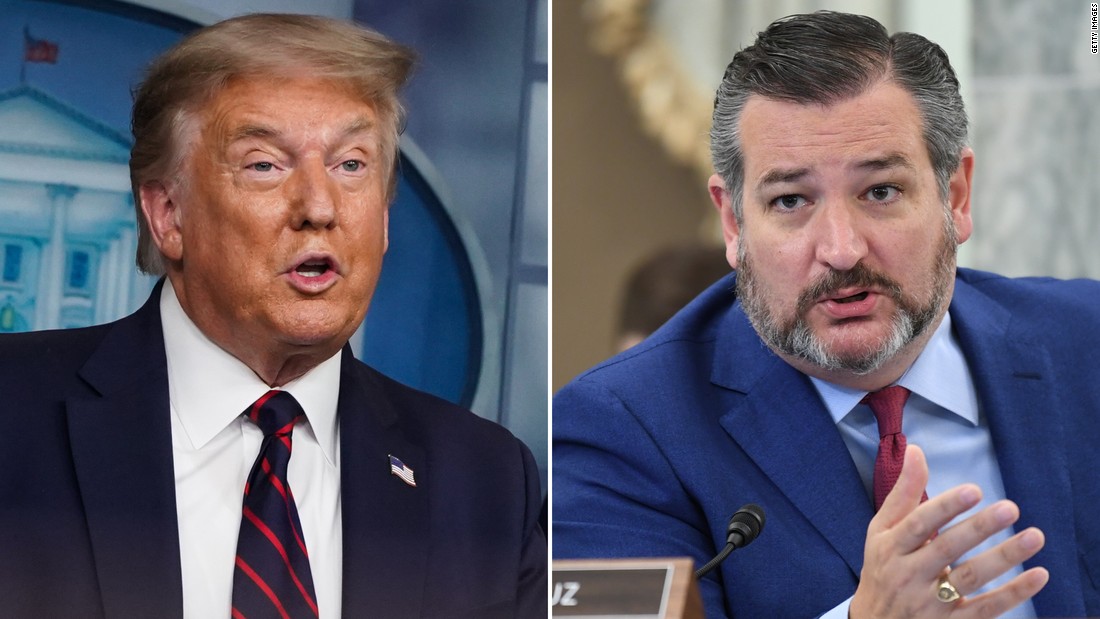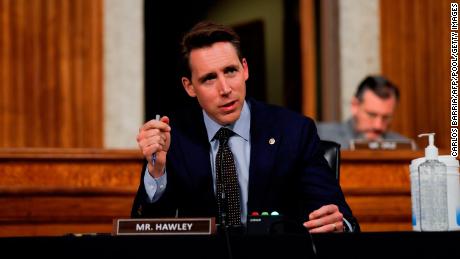Efforts to overturn the 2020 election show how Trump’s agenda might manifest itself in the coming years
But the push to cast doubt over the election result is now escalating beyond earlier bids by ambitious Republicans to curry favor with Trump by idly urging on his would-be power grab. The announcement Saturday from Republican senators and senators-elect cut deeper and, framed in a maddening circular logic, argued that Congress should commission an “emergency 10-day audit” of results from “disputed states” because of the volume of “allegations of voter fraud, violations and lax enforcement of election law, and other voting irregularities.”
Those charges, of course, are coming from the same cohort of lawmakers now trying to refashion them as evidence to support their actions. The group’s citation of a poll that underscores voters’ distrust in the election process ignores Trump’s role in ginning up an increasingly paranoiac strain of conservatism — one that is shape-shifting now, in the final days of his presidency, into what is likely to become an enduring and corrosive political faction. That their announcement came on the eve of a new Congress, and for some less than a day before they take their oaths on the Senate floor, provided an immediate preview of Trumpism’s sticking power and how it might manifest itself — with more diplomatic language, but no less authoritarian tendencies — in the coming years.
Notably, none of the officials who signed the Saturday statement, nor any of what could be as many as 140 allies in the House, have suggested that the election fraud that so concerns them might have also affected their own races. The fix, as they would have Americans believe, started and stopped at the top of the ticket.
The absurdity is not entirely lost on the group, which added a new wrinkle with its call for Congress to intervene in the Electoral College process by engineering a kind of Star Chamber to review results from an unstated number of unnamed states.
“Once completed, individual states would evaluate the Commission’s findings and could convene a special legislative session to certify a change in their vote, if needed,” the Republican senators wrote. Never mind that the states they likely have in mind have already certified the will of their voters and repeatedly resisted prodding from Trump to ignore state law as part of a scheme to flip the election in his favor.
Republicans play multiple angles
Kemp is one of a handful of Republicans to speak out against Trump’s behavior. Pennsylvania Sen. Pat Toomey, who is retiring in 2022, has also been critical of his GOP colleagues’ rhetoric and, on Saturday, responded to the new announcement with a sharp rebuke of the senators involved.
“A fundamental, defining feature of a democratic republic is the right of the people to elect their own leaders. The effort by Senators Hawley, Cruz, and others to overturn the results of the 2020 presidential election in swing states like Pennsylvania directly undermines this right,” Toomey said in a statement.
Biden’s success in Pennsylvania, Toomey concluded, said little about the election process and could be “easily explained by the decline in suburban support for President Trump and the President’s slightly smaller victory margins in most rural counties.”
Hawley shot back at Toomey late Saturday in an email to the Republican Senate conference, obtained by CNN from a GOP source, accusing his colleague of “putting words into (his mouth)” before recycling a series of post-hoc complaints about the election rules in Pennsylvania.
But the stunt in the works now figures to have longer political and social coattails. It fits in with a wider, burgeoning attempt to further constrain voting rights in the future. Back in November, Florida Republican Sen. Rick Scott, who is not taking part in this Wednesday’s protest, signaled that he would seek to parlay the confusion created by Trump and his allies into support for new federal restrictions.
“This election has shown we need major reforms to our election systems, including Voter ID laws across the nation, to protect against fraud and rebuild the American people’s trust in fair outcomes,” Scott tweeted, linking to a press release about his “VOTER Act.”
Precisely what about the election had “shown” that action was necessary was left ominously unstated. After years of being accused of enabling the President, Scott offered a preview of how some in the GOP hope he could enable them to gather support for their own, pre-existing agenda.
By Saturday, though, Pence’s office was cheering on congressional Republicans.
“Vice President Pence shares the concerns of millions of Americans about voter fraud and irregularities in the last election,” Pence chief of staff Marc Short said. “The Vice President welcomes the efforts of members of the House and Senate to use the authority they have under the law to raise objections and bring forward evidence before the Congress and the American people on January 6th.”
Democrats bite back
For his part, Biden — who as vice president himself oversaw without incident the same ceremonial confirmation, in 2016, that sealed Trump’s election — has been mostly understated in his comments on Republican machinations.
In a December speech, he noted the dozens of failed legal challenges brought by the Trump campaign and praised elections officials and workers for doing their duty in the face of “political pressure, verbal abuse and even threats of physical violence.”
“They could not and would not give credence to what they know is not true,” Biden said. “They knew this election was overseen, it was honest, it was free and it was fair. They saw it with their own eyes, and they wouldn’t be bullied into saying anything different.”
On Saturday, a spokesman for Biden, Mike Gwin, responded to news that a new crop of Republican senators would be objecting to the final certification by dismissing their plans as political theater.
“This stunt won’t change the fact that President-elect Biden will be sworn in on January 20th,” Gwin said, reiterating Biden and the transition’s earlier position. “And these baseless claims have already been examined and dismissed by Trump’s own Attorney General, dozens of courts, and election officials from both parties.”
Other Democrats were less circumspect.
Sen. Bernie Sanders, a Vermont independent who caucuses with the Democrats and was Biden’s toughest competition in the 2020 party primary, called the effort “pathetic” and its aims “unconstitutional.”
“What all of this comes down to is that Donald Trump and right wing extremists are refusing to accept the will of the people and the fact that Trump lost the election,” Sanders said in a statement. “In their contempt for democracy, they are using lies and conspiracy theories about ‘voter fraud’ in an attempt to overturn the election results.”
He was joined, among others, by another former Biden primary rival, Democratic Minnesota Sen. Amy Klobuchar, in cutting through the façade of concern projected by their GOP counterparts.
“For a group of my Republican colleagues to claim that they want an additional federal ‘commission’ to supersede state certifications when the votes have already been counted, recounted, litigated, and state-certified,” Klobuchar said, “amounts to nothing more than an attempt to subvert the will of the voters.”
CNN’s Manu Raju contributed to this report.
![]()




